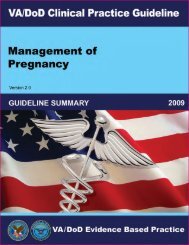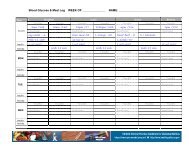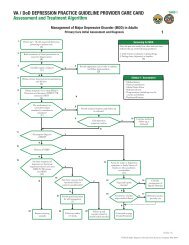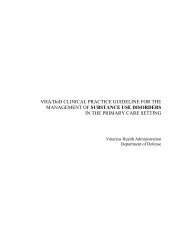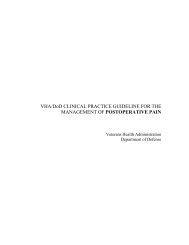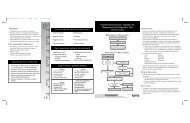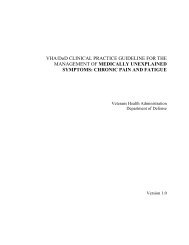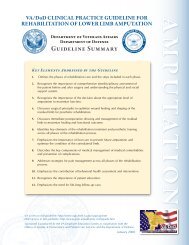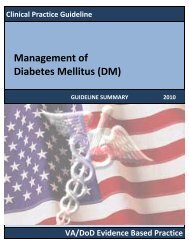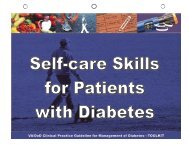DM Full Guideline (2010) - VA/DoD Clinical Practice Guidelines Home
DM Full Guideline (2010) - VA/DoD Clinical Practice Guidelines Home
DM Full Guideline (2010) - VA/DoD Clinical Practice Guidelines Home
You also want an ePaper? Increase the reach of your titles
YUMPU automatically turns print PDFs into web optimized ePapers that Google loves.
Version 4.0<br />
ANNOTATION<br />
<strong>VA</strong>/<strong>DoD</strong> <strong>Clinical</strong> <strong>Practice</strong> <strong>Guideline</strong><br />
for the Management of Diabetes Mellitus<br />
Patients often hear of developments in diabetes or have specific questions regarding newer treatment modalities.<br />
They may also decide they want to improve their glycemic control or their life style.<br />
I. Provide Materials or Patient Reference List or Refer As Needed<br />
OBJECTIVE<br />
Provide additional information in response to the patient’s questions about new treatments or advanced selfmanagement<br />
skills that have been communicated from other persons with diabetes or the media.<br />
ANNOTATION<br />
If the patient requests additional information it may not be essential for the caregiver to intervene professionally or<br />
refer to a specialist.<br />
J. Methods for Providing DSME<br />
BACKGROND<br />
There is a wide variety of means to provide self-management education and to promote self-management behaviors.<br />
Choose the method most consistent with the patient, clinical, and organizational contexts.<br />
RECOMMENDATIONS<br />
The following overriding principles were based on existing evidence used to guide the review and revision of the<br />
DSME Standards:<br />
1. Diabetes education is effective for improving clinical outcomes and quality of life, at least in the shortterm.<br />
2. DSME has evolved from primarily didactic presentations to more theoretically based empowerment<br />
models.<br />
3. There is no one “best” education program or approach; however, programs incorporating behavioral and<br />
psychosocial strategies demonstrate improved outcomes. Additional studies show that culturally and age<br />
appropriate programs improve outcomes and that group education is effective.<br />
4. Ongoing support is critical to sustain progress made by participants during the DSME program.<br />
5. Behavioral goal-setting is an effective strategy to support self-management behaviors.<br />
DISCUSSION<br />
Treatment Adherence<br />
Vermeire et al., (2005) reviewed 21 studies assessing interventions aimed at improving adherence to treatment<br />
recommendations, not to diet or exercise recommendations, in people with Type 2 diabetes in primary care,<br />
outpatient, community and home, and hospital settings. Adherence measurement tools and outcomes evaluated in<br />
these studies were heterogeneous. Nurse-led interventions, home aids, diabetes education, pharmacy led<br />
interventions, adaptation of dosing, and frequency of medication taking showed a small effect on a variety of<br />
outcomes including HbA 1 c. They concluded that the current efforts to facilitate adherence to treatment<br />
recommendations of people with type 2 diabetes demonstrated neither significant effects nor harm. Other reviews<br />
with different selection criteria have been somewhat more positive.<br />
Telehealth/Electronics:<br />
A wide variety of approaches have been used in delivery and support of computer-aided diabetes education and selfmanagement<br />
programs. In a systematic review of 219 RCTs involving 3167 patients (92% adults), Austin Boren et<br />
al., (2006) identified three computerized approaches in the trials reviewed: Computerized touch screen assessment<br />
and instruction, computerized assessment with individualized counseling or feedback, and games or simulation;<br />
methods used in the control groups were variable. Outcome measures were grouped according to DSME core<br />
outcome measures: learning, behavior change, clinical improvement, and improved health status. Results<br />
Module M: Self-management Page 114




